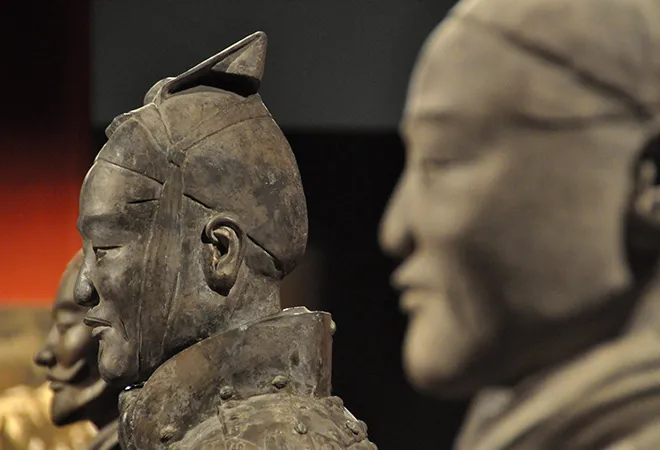
“Beneath the rule of men entirely great, the pen is mightier than the sword” — wrote Edward Bulwer-Lytton in 1839. Many centuries before these words became immortal, the idea of aggrieved subjects penning their petitions directly to the Son of Heaven was well established practice since the earliest times of Chinese Imperial rule. Known as xinfang, it was the means to draw the Emperor’s attention to the wrong-doings of his officials and to seek justice, but occasionally it also became a means to question and topple the Son of Heaven.
Two extraordinary ‘petitions’ have emerged out of China in recent weeks — Ren Zhiqiang’s essay My reading of February 23 and Xu Zhangrun’s essay Viral Alarm: When Fury overcomes Fear. Both were written by former members of the Establishment; Xu was a Professor at Qinghua University in Beijing which is like the MIT of China; Ren was a bonafide Red Capitalist. Both have been subject to censorship. And both have disappeared from public view.
Their contents are broadly similar — the rapier is pointed at President Xi Jinping. They hold him personally responsible for the devastation caused inside and outside China as a result of the poor handling of the COVID19 crisis. Labelled as the “Emperor” by Ren and “The Ultimate Arbiter” by Xu, the two essays are a searing critique of the Communist Party’s failure towards it’s own people in this crisis.
Ren Zhiqiang is ruthless in his attack on Xi Jinping’s attempts, post-facto, to ante-date his personal leadership in the crisis. He derides Xi’s claims of having been on top of the situation in dealing with the pandemic since 7 January, and ridicules the Party’s unconditional endorsement of Xi’s successful leadership in a National Party Conference on 23 February, in these words: “Standing there was not some Emperor showing us his new clothes, but a clown with no clothes on who is still determined to play Emperor.” Xu’s portrayal of a helpless leader in the face of the challenge is equally damning: “Faced with this virus the Leader has flailed about seeking answers with ever greater urgency……” Ren and Xu allege a ‘cover-up,’ and pose fundamental questions such as why there was no public announcement about the epidemic in the days after 7 January, if, in fact, Xi Jinping had chaired a Politburo meeting to give “directions” on handling it, why China permitted all manner of national events in the two weeks after 7 January, and why millions of Chinese were permitted to travel in the run-up to the annual Spring Festival Holiday as a result of which it became a global pandemic.
Both the ‘petitions’ delve beyond the immediate crisis to the very heart of the matter. “The cause of all this,” writes Xu, “lies with The Axle (a term he uses for Xi Jinping) and the cabal that surrounds him.” It is here that their pens begins to act as a knife by peeling away the layers of power that they see President Xi as having accumulated in his quest to be the “core” of China — the systematic consolidation of all authority, civilian, military and Party, in his person; the removal of constitutional provisions that limit the term of any leader who desires to be the President; the re-merger of the functions of Party and State by arrogating authority that should vest in the Premier of the State Council especially on the economy; the control over all policy through self-appointed Groups instead of Party Committees; the endless political purges in the name of an anti-corruption campaign that has silenced Xi’s political challengers; and the appointment of cronies as senior officials who live only to “protect the Emperor.”
After China was devastated by the Cultural Revolution because of Mao Zedong’s insane use of all means possible to remain as the sole Leader of his billion people, a wise Deng Xiaoping instituted new “Guiding Principles for Inner-Party Political Life” in 1980. Deng himself was no democrat, a fact that the Tian An Men Incident would conclusively establish in 1989, but he understood that unless “rules” were laid down in an institutional way, another Mao could emerge. The essence of these rules was ‘collective leadership.’ Deng believed that when a group acted in equilibrium, the danger of arbitrary decision-making or a grab for power by one individual could be minimised. He introduced age limits for holders of Party and State offices; oversaw the separation of Party and State which allowed for a balance between the General Secretary of the Communist Party and the Premier of the State Council; forbade the replacement of authorised Party Committees by any other ad hoc mechanism for policymaking; and curbed the privileges of the Red Aristocracy. Deng led by example. He demurred when offered the Party Chairmanship that Mao had once held, and demitted most State and Party positions by 1987. Collective leadership became the Chinese Communist Party’s leitmotif for the next thirty years. It served the Party well, allowing it to ride out the political storm of 1989, and to keep the balance in the post-Deng period after 1997 between the factions of the two General Secretaries — Jiang Zemin and Hu Jintao. In this period China’s GDP quadrupled and its global stature grew proportionately.
Xi Jinping succeeded Hu Jintao as the ‘safer bet’ in 2012 when the prospects of the flamboyant Bo Xilai as the next Leader caused trepidation within the Party. Their judgment, and that of the world in general, could not have been more misplaced. President Xi Jinping has, since his elevation, proceeded to systematically dismantle Deng’s legacy. Xi Jinping Thought has been elevated to bring it on par with Mao’s philosophy. The President’s colleagues have been mute spectators to this concentration of all power and offices in his person, including the newly minted position of Commander-in-Chief of the People’s Liberation Army. His handling of the Hongkong protests, of the re-election of a pro-independence ‘government’ in Taiwan, of the Sino-US trade war, have passed without serious challenge. This time it might be different. As Ren Zhiqiang points out: “The Emperor can lie to himself about wearing clothes but even the children know when the Emperor’s bottom is bare, and those people who don’t dare to say the Emperor is naked, they still all know what it is to wear new clothes and what it is to go naked.”
Petitions in China have a curious way of lighting a spark. The high-and-mighty find them useful to effect change, sometimes even dynastic change. This was the case with an anonymous poem pasted in Tian An Men Square on 4 April 1976 in memory of the late Premier Zhou Enlai:
In my grief I hear demons shriek
I weep while wolves and jackals laugh
Though tears I shed to mourn a hero
With head raised high I draw my sword
The poem became the battle-cry of a public exhausted by ten years of chaos and emboldened the leadership to act in October 1976 by toppling the Gang of Four led by Mao’s widow Jiang Qing, and ushering China into an era of stability and reform.
Whether the poem had official support from the shadows is unknown, although in all likelihood it did. Other ‘petitions’ had more obvious support from the shadows. In 1958 one of Mao’s closest associates and Defence Minister, Marshal Peng Dehuai, wrote to Mao about the ‘mistake’ of the Great Leap Forward which everybody in the Party recognised as ill-conceived and disastrously executed. Millions of Chinese died. But it needed a ‘petition’ to embolden others to curb Mao’s authority and to rescue the Chinese economy and people from mass starvation. In 1986 a prominent Chinese intellectual and Party Member, Wang Ruowang, wrote “One Party Dictatorship Can only Lead to Tyranny” — an indictment of the Communist Party’s absolute grip on power. It was used to bring down a General Secretary who had grown uncomfortably powerful — Hu Yaobang — on 16 January 1987. And who can forget Fang Lizhi’s Open Letter to Deng Xiaoping on 6 January 1989 to release all political prisoners in China including Wei Jingsheng known as the father of Chinese democracy, which was used to purge another General Secretary, Zhao Ziyang, who was threatening to dilute the absolute dictatorship of the Communist Party.
Whether the essays of Ren and Xu embolden the silent to speak and act is a matter that bears watching. President Xi may still ride out this storm, as he has others. But small indications of nervousness belie the sanguine image that all is well in the Empire. Of a sudden, out of the blue, Wuhan revises the number of COVID19 fatalities by fifty percent in a single day. Does this have anything to do with the fact that it is no longer possible to hide the truth because people can count the urns being delivered to families of their cremated relatives? Days after taking the official line that the origins of COVID19 should be scientifically researched, the Chinese State imposes restrictions on the publication of its own academic research on the origins without approval of the central authority. Does this mean they fear their own people learning when the virus first manifested in China? Reading the tea leaves is always a challenge in China. The public mood is difficult to gauge but if the internet is any indicator the State censors are already having a challenging time. The Chinese President has put himself on public view by officially claiming to be on top of things since at least 7 January. An Emperor in public had better be wearing clothes.
I conclude with two footnotes.
The first is this: the Chinese are a superstitious people. They might not believe in religion but they are steeped in tradition and culture. Since the dawn of imperial rule in China, the withdrawal of the Mandate of Heaven is believed to be signalled by natural catastrophes. In 1976, the great Tangshan Earthquake, which killed over a half-million Chinese, portending the death of Mao and the fall of the Gang of Four. COVID19 is a greatest natural catastrophe that has befallen China since Tangshan.
The second is this: petitioners themselves in China have seldom fared well. Peng Dehuai lost his job and then his life during the Cultural Revolution. Wang Ruowang and Fang Lizhi were arrested and forced into exile. In all probability Ren Zhiqiang and Xu Zhangrun will face a similar fate.
The views expressed above belong to the author(s). ORF research and analyses now available on Telegram! Click here to access our curated content — blogs, longforms and interviews.




 PREV
PREV


